Education Assignment: Building a Positive Learning Environment
VerifiedAdded on 2022/08/20
|12
|2884
|15
Essay
AI Summary
This essay delves into the concept of a positive learning framework, emphasizing strategies to foster a supportive and engaging educational environment. It explores the importance of social competence, problem-solving abilities, autonomy, and a sense of purpose in motivating students and promoting academic achievement. The essay examines a three-phase model for effective classroom management, highlighting the significance of teacher behavior and response to student actions. It discusses the application of these strategies, supported by the perspectives of various theorists, including Dreikurs, Adler, Glasser, and Kohn, to provide insights into creating a conducive learning environment. The essay emphasizes the need for positive psychology principles, such as the "circle of courage," to address behavioral and emotional disorders effectively. The conclusion reinforces the significance of student rights, teacher-student collaboration, and the implementation of proactive strategies to improve student outcomes.
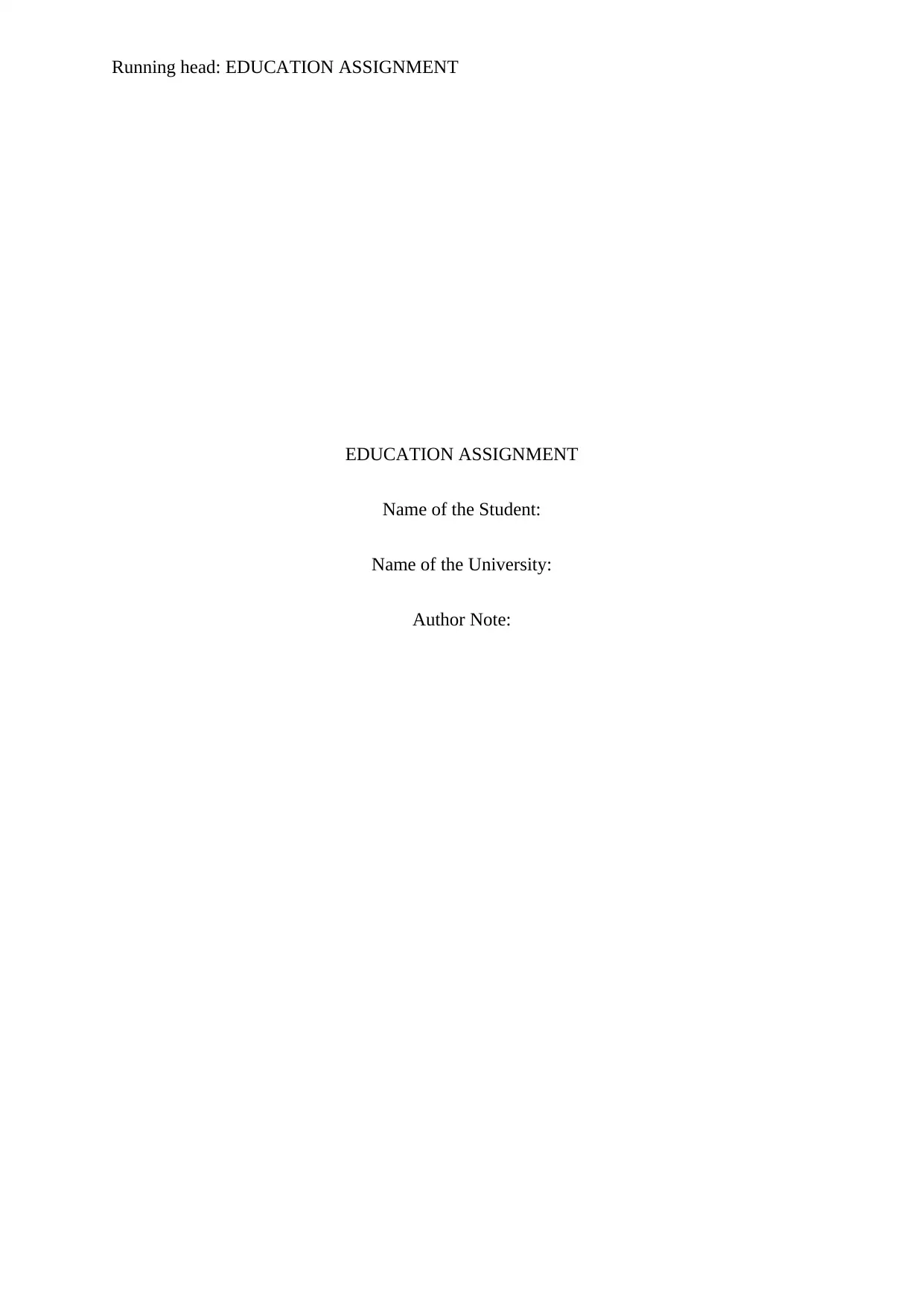
Running head: EDUCATION ASSIGNMENT
EDUCATION ASSIGNMENT
Name of the Student:
Name of the University:
Author Note:
EDUCATION ASSIGNMENT
Name of the Student:
Name of the University:
Author Note:
Paraphrase This Document
Need a fresh take? Get an instant paraphrase of this document with our AI Paraphraser
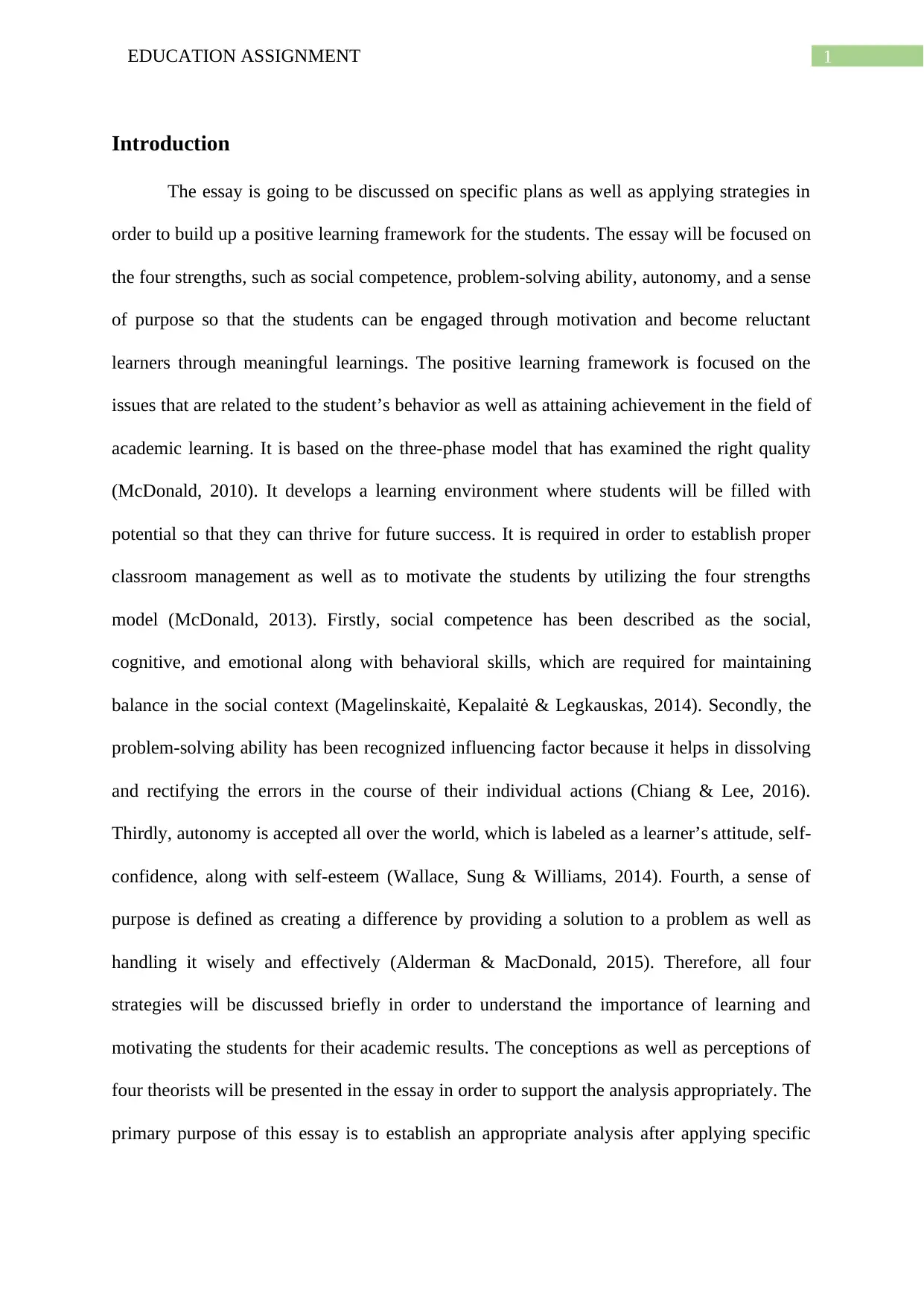
1EDUCATION ASSIGNMENT
Introduction
The essay is going to be discussed on specific plans as well as applying strategies in
order to build up a positive learning framework for the students. The essay will be focused on
the four strengths, such as social competence, problem-solving ability, autonomy, and a sense
of purpose so that the students can be engaged through motivation and become reluctant
learners through meaningful learnings. The positive learning framework is focused on the
issues that are related to the student’s behavior as well as attaining achievement in the field of
academic learning. It is based on the three-phase model that has examined the right quality
(McDonald, 2010). It develops a learning environment where students will be filled with
potential so that they can thrive for future success. It is required in order to establish proper
classroom management as well as to motivate the students by utilizing the four strengths
model (McDonald, 2013). Firstly, social competence has been described as the social,
cognitive, and emotional along with behavioral skills, which are required for maintaining
balance in the social context (Magelinskaitė, Kepalaitė & Legkauskas, 2014). Secondly, the
problem-solving ability has been recognized influencing factor because it helps in dissolving
and rectifying the errors in the course of their individual actions (Chiang & Lee, 2016).
Thirdly, autonomy is accepted all over the world, which is labeled as a learner’s attitude, self-
confidence, along with self-esteem (Wallace, Sung & Williams, 2014). Fourth, a sense of
purpose is defined as creating a difference by providing a solution to a problem as well as
handling it wisely and effectively (Alderman & MacDonald, 2015). Therefore, all four
strategies will be discussed briefly in order to understand the importance of learning and
motivating the students for their academic results. The conceptions as well as perceptions of
four theorists will be presented in the essay in order to support the analysis appropriately. The
primary purpose of this essay is to establish an appropriate analysis after applying specific
Introduction
The essay is going to be discussed on specific plans as well as applying strategies in
order to build up a positive learning framework for the students. The essay will be focused on
the four strengths, such as social competence, problem-solving ability, autonomy, and a sense
of purpose so that the students can be engaged through motivation and become reluctant
learners through meaningful learnings. The positive learning framework is focused on the
issues that are related to the student’s behavior as well as attaining achievement in the field of
academic learning. It is based on the three-phase model that has examined the right quality
(McDonald, 2010). It develops a learning environment where students will be filled with
potential so that they can thrive for future success. It is required in order to establish proper
classroom management as well as to motivate the students by utilizing the four strengths
model (McDonald, 2013). Firstly, social competence has been described as the social,
cognitive, and emotional along with behavioral skills, which are required for maintaining
balance in the social context (Magelinskaitė, Kepalaitė & Legkauskas, 2014). Secondly, the
problem-solving ability has been recognized influencing factor because it helps in dissolving
and rectifying the errors in the course of their individual actions (Chiang & Lee, 2016).
Thirdly, autonomy is accepted all over the world, which is labeled as a learner’s attitude, self-
confidence, along with self-esteem (Wallace, Sung & Williams, 2014). Fourth, a sense of
purpose is defined as creating a difference by providing a solution to a problem as well as
handling it wisely and effectively (Alderman & MacDonald, 2015). Therefore, all four
strategies will be discussed briefly in order to understand the importance of learning and
motivating the students for their academic results. The conceptions as well as perceptions of
four theorists will be presented in the essay in order to support the analysis appropriately. The
primary purpose of this essay is to establish an appropriate analysis after applying specific
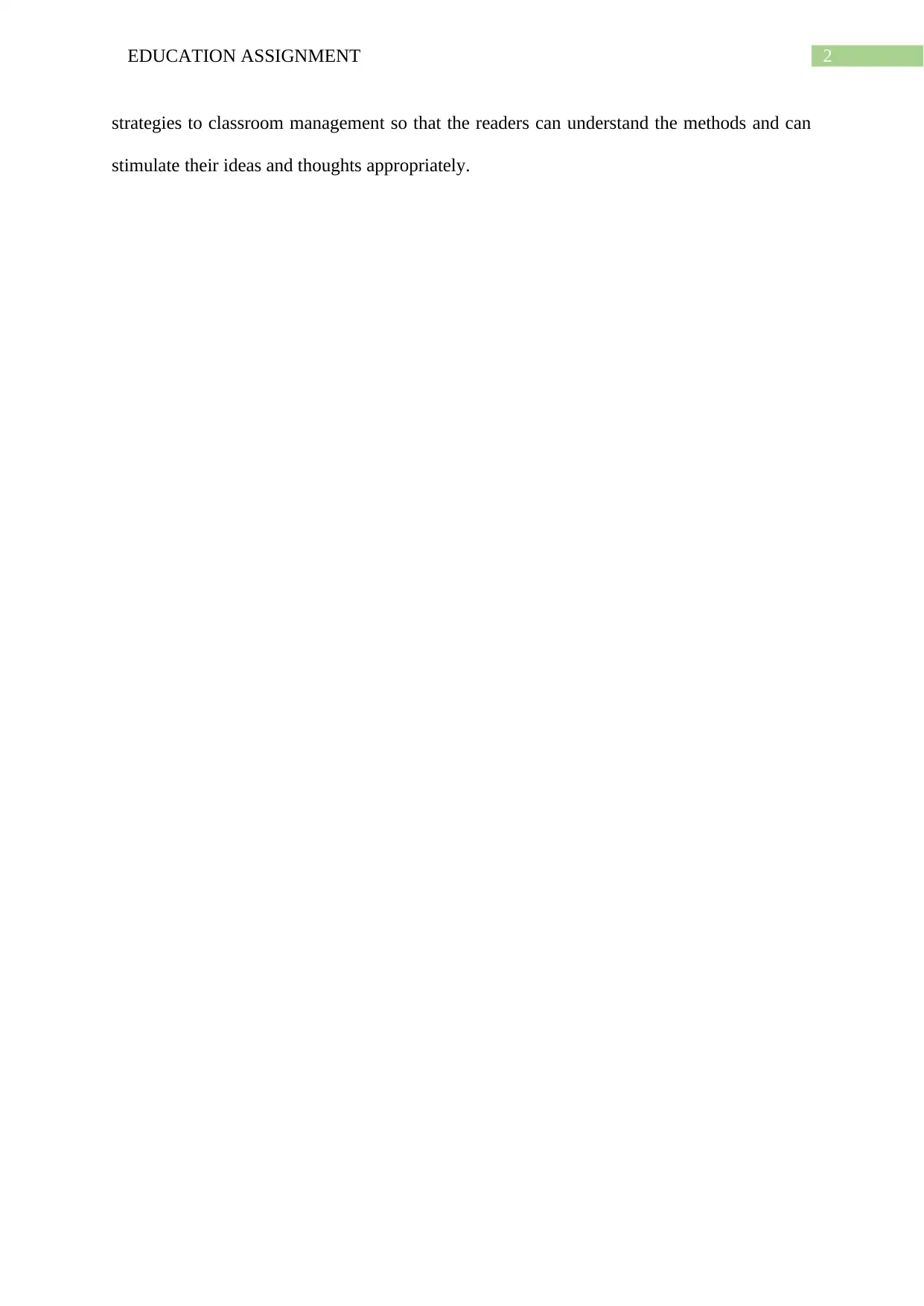
2EDUCATION ASSIGNMENT
strategies to classroom management so that the readers can understand the methods and can
stimulate their ideas and thoughts appropriately.
strategies to classroom management so that the readers can understand the methods and can
stimulate their ideas and thoughts appropriately.
⊘ This is a preview!⊘
Do you want full access?
Subscribe today to unlock all pages.

Trusted by 1+ million students worldwide
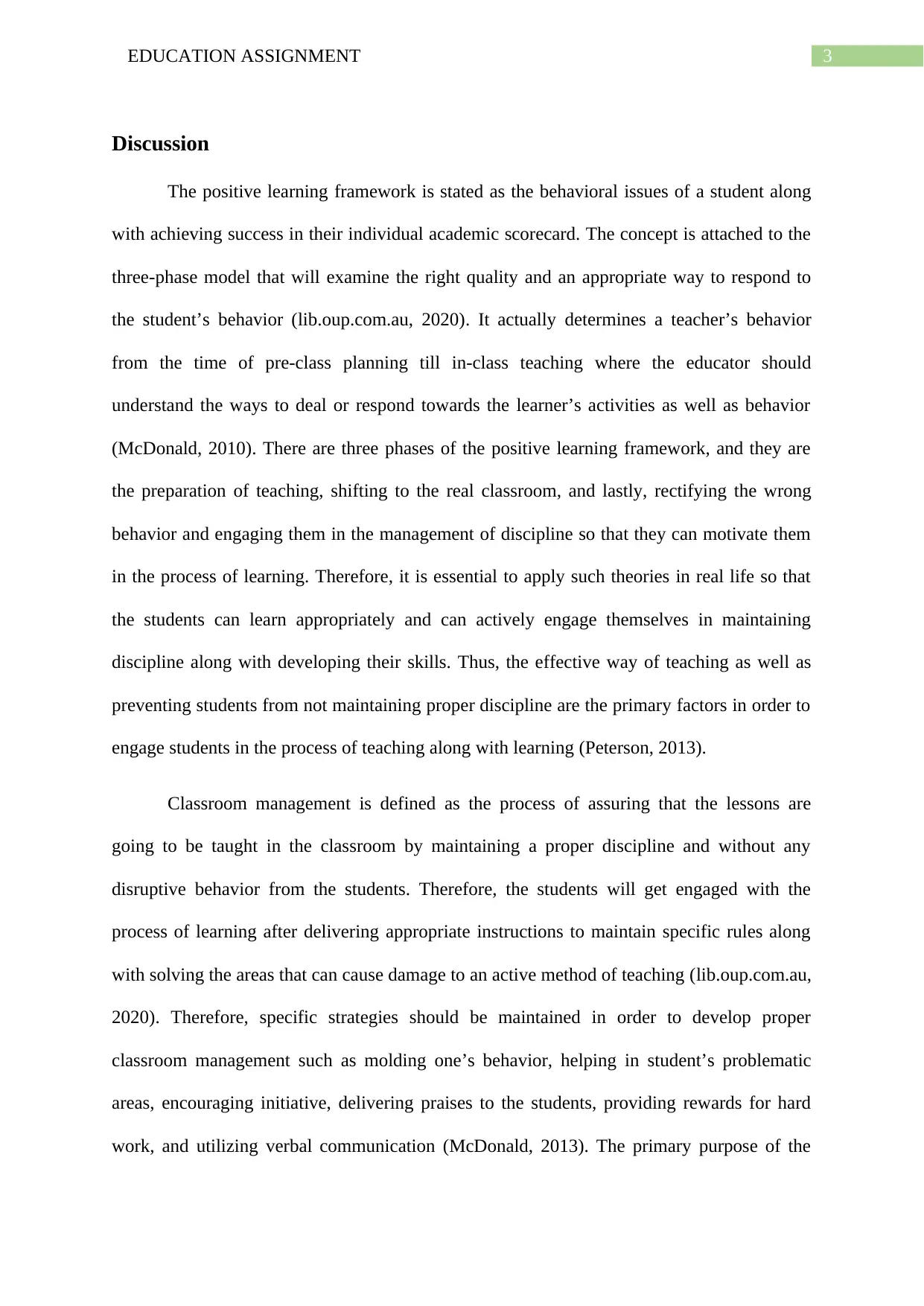
3EDUCATION ASSIGNMENT
Discussion
The positive learning framework is stated as the behavioral issues of a student along
with achieving success in their individual academic scorecard. The concept is attached to the
three-phase model that will examine the right quality and an appropriate way to respond to
the student’s behavior (lib.oup.com.au, 2020). It actually determines a teacher’s behavior
from the time of pre-class planning till in-class teaching where the educator should
understand the ways to deal or respond towards the learner’s activities as well as behavior
(McDonald, 2010). There are three phases of the positive learning framework, and they are
the preparation of teaching, shifting to the real classroom, and lastly, rectifying the wrong
behavior and engaging them in the management of discipline so that they can motivate them
in the process of learning. Therefore, it is essential to apply such theories in real life so that
the students can learn appropriately and can actively engage themselves in maintaining
discipline along with developing their skills. Thus, the effective way of teaching as well as
preventing students from not maintaining proper discipline are the primary factors in order to
engage students in the process of teaching along with learning (Peterson, 2013).
Classroom management is defined as the process of assuring that the lessons are
going to be taught in the classroom by maintaining a proper discipline and without any
disruptive behavior from the students. Therefore, the students will get engaged with the
process of learning after delivering appropriate instructions to maintain specific rules along
with solving the areas that can cause damage to an active method of teaching (lib.oup.com.au,
2020). Therefore, specific strategies should be maintained in order to develop proper
classroom management such as molding one’s behavior, helping in student’s problematic
areas, encouraging initiative, delivering praises to the students, providing rewards for hard
work, and utilizing verbal communication (McDonald, 2013). The primary purpose of the
Discussion
The positive learning framework is stated as the behavioral issues of a student along
with achieving success in their individual academic scorecard. The concept is attached to the
three-phase model that will examine the right quality and an appropriate way to respond to
the student’s behavior (lib.oup.com.au, 2020). It actually determines a teacher’s behavior
from the time of pre-class planning till in-class teaching where the educator should
understand the ways to deal or respond towards the learner’s activities as well as behavior
(McDonald, 2010). There are three phases of the positive learning framework, and they are
the preparation of teaching, shifting to the real classroom, and lastly, rectifying the wrong
behavior and engaging them in the management of discipline so that they can motivate them
in the process of learning. Therefore, it is essential to apply such theories in real life so that
the students can learn appropriately and can actively engage themselves in maintaining
discipline along with developing their skills. Thus, the effective way of teaching as well as
preventing students from not maintaining proper discipline are the primary factors in order to
engage students in the process of teaching along with learning (Peterson, 2013).
Classroom management is defined as the process of assuring that the lessons are
going to be taught in the classroom by maintaining a proper discipline and without any
disruptive behavior from the students. Therefore, the students will get engaged with the
process of learning after delivering appropriate instructions to maintain specific rules along
with solving the areas that can cause damage to an active method of teaching (lib.oup.com.au,
2020). Therefore, specific strategies should be maintained in order to develop proper
classroom management such as molding one’s behavior, helping in student’s problematic
areas, encouraging initiative, delivering praises to the students, providing rewards for hard
work, and utilizing verbal communication (McDonald, 2013). The primary purpose of the
Paraphrase This Document
Need a fresh take? Get an instant paraphrase of this document with our AI Paraphraser
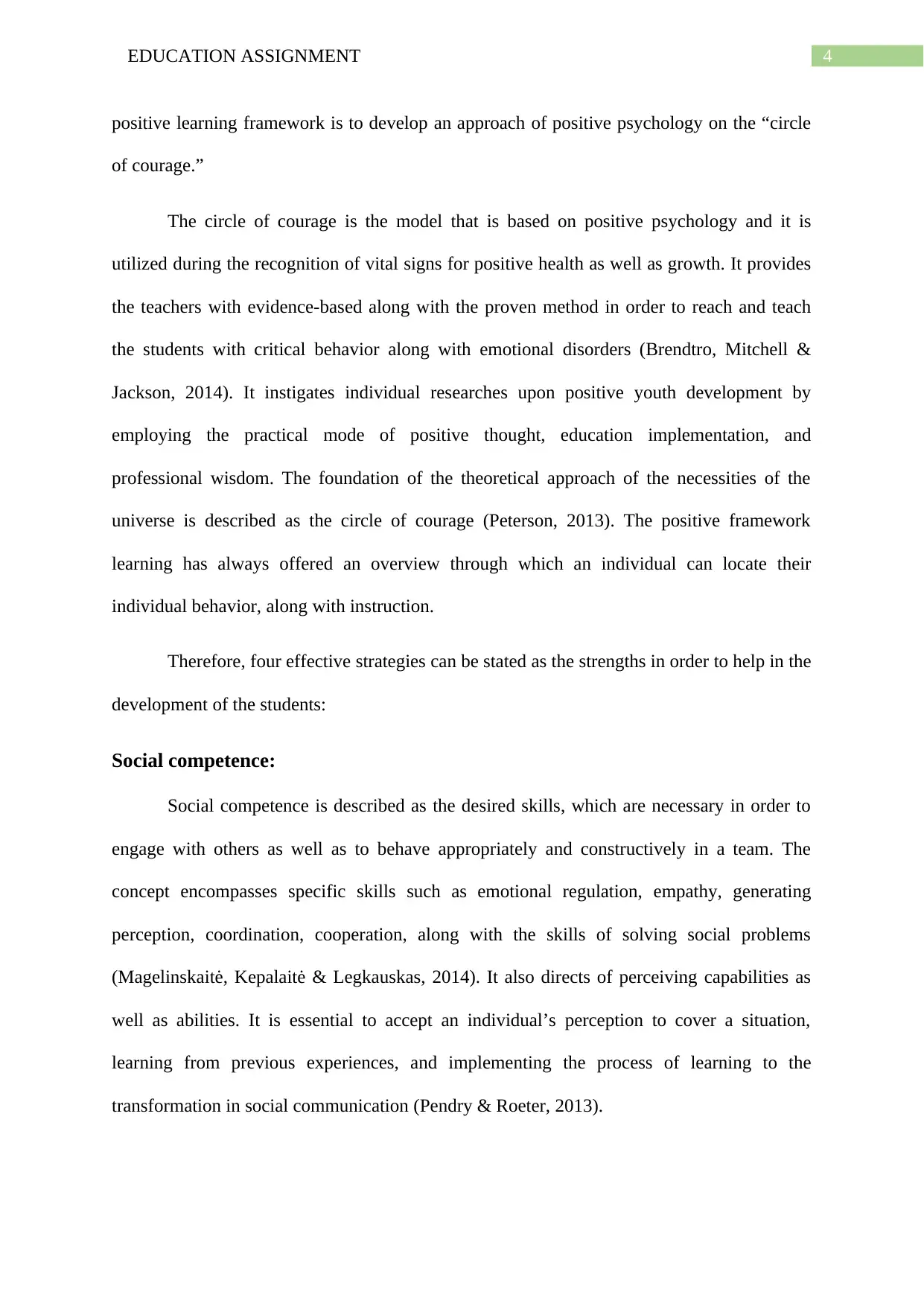
4EDUCATION ASSIGNMENT
positive learning framework is to develop an approach of positive psychology on the “circle
of courage.”
The circle of courage is the model that is based on positive psychology and it is
utilized during the recognition of vital signs for positive health as well as growth. It provides
the teachers with evidence-based along with the proven method in order to reach and teach
the students with critical behavior along with emotional disorders (Brendtro, Mitchell &
Jackson, 2014). It instigates individual researches upon positive youth development by
employing the practical mode of positive thought, education implementation, and
professional wisdom. The foundation of the theoretical approach of the necessities of the
universe is described as the circle of courage (Peterson, 2013). The positive framework
learning has always offered an overview through which an individual can locate their
individual behavior, along with instruction.
Therefore, four effective strategies can be stated as the strengths in order to help in the
development of the students:
Social competence:
Social competence is described as the desired skills, which are necessary in order to
engage with others as well as to behave appropriately and constructively in a team. The
concept encompasses specific skills such as emotional regulation, empathy, generating
perception, coordination, cooperation, along with the skills of solving social problems
(Magelinskaitė, Kepalaitė & Legkauskas, 2014). It also directs of perceiving capabilities as
well as abilities. It is essential to accept an individual’s perception to cover a situation,
learning from previous experiences, and implementing the process of learning to the
transformation in social communication (Pendry & Roeter, 2013).
positive learning framework is to develop an approach of positive psychology on the “circle
of courage.”
The circle of courage is the model that is based on positive psychology and it is
utilized during the recognition of vital signs for positive health as well as growth. It provides
the teachers with evidence-based along with the proven method in order to reach and teach
the students with critical behavior along with emotional disorders (Brendtro, Mitchell &
Jackson, 2014). It instigates individual researches upon positive youth development by
employing the practical mode of positive thought, education implementation, and
professional wisdom. The foundation of the theoretical approach of the necessities of the
universe is described as the circle of courage (Peterson, 2013). The positive framework
learning has always offered an overview through which an individual can locate their
individual behavior, along with instruction.
Therefore, four effective strategies can be stated as the strengths in order to help in the
development of the students:
Social competence:
Social competence is described as the desired skills, which are necessary in order to
engage with others as well as to behave appropriately and constructively in a team. The
concept encompasses specific skills such as emotional regulation, empathy, generating
perception, coordination, cooperation, along with the skills of solving social problems
(Magelinskaitė, Kepalaitė & Legkauskas, 2014). It also directs of perceiving capabilities as
well as abilities. It is essential to accept an individual’s perception to cover a situation,
learning from previous experiences, and implementing the process of learning to the
transformation in social communication (Pendry & Roeter, 2013).
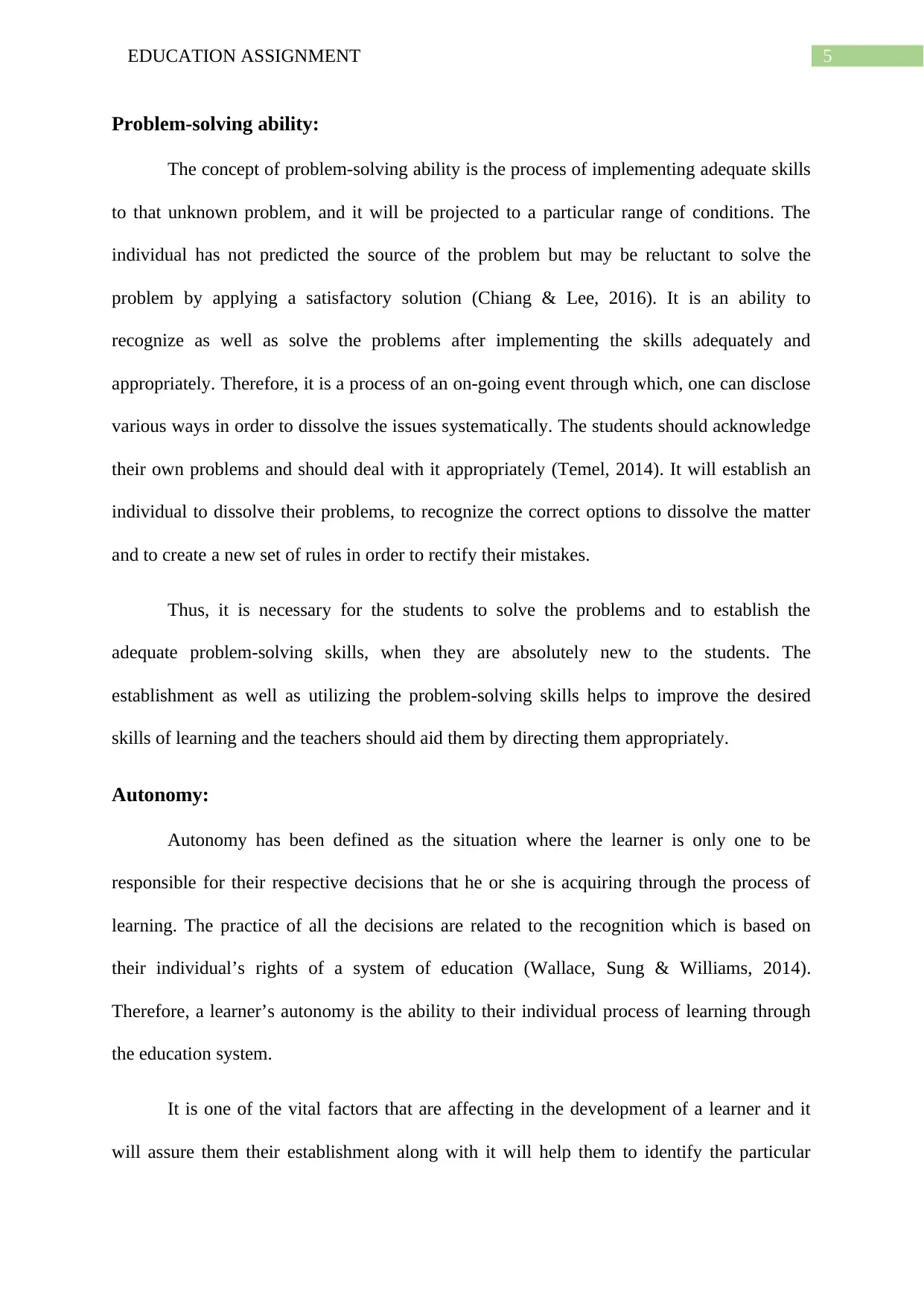
5EDUCATION ASSIGNMENT
Problem-solving ability:
The concept of problem-solving ability is the process of implementing adequate skills
to that unknown problem, and it will be projected to a particular range of conditions. The
individual has not predicted the source of the problem but may be reluctant to solve the
problem by applying a satisfactory solution (Chiang & Lee, 2016). It is an ability to
recognize as well as solve the problems after implementing the skills adequately and
appropriately. Therefore, it is a process of an on-going event through which, one can disclose
various ways in order to dissolve the issues systematically. The students should acknowledge
their own problems and should deal with it appropriately (Temel, 2014). It will establish an
individual to dissolve their problems, to recognize the correct options to dissolve the matter
and to create a new set of rules in order to rectify their mistakes.
Thus, it is necessary for the students to solve the problems and to establish the
adequate problem-solving skills, when they are absolutely new to the students. The
establishment as well as utilizing the problem-solving skills helps to improve the desired
skills of learning and the teachers should aid them by directing them appropriately.
Autonomy:
Autonomy has been defined as the situation where the learner is only one to be
responsible for their respective decisions that he or she is acquiring through the process of
learning. The practice of all the decisions are related to the recognition which is based on
their individual’s rights of a system of education (Wallace, Sung & Williams, 2014).
Therefore, a learner’s autonomy is the ability to their individual process of learning through
the education system.
It is one of the vital factors that are affecting in the development of a learner and it
will assure them their establishment along with it will help them to identify the particular
Problem-solving ability:
The concept of problem-solving ability is the process of implementing adequate skills
to that unknown problem, and it will be projected to a particular range of conditions. The
individual has not predicted the source of the problem but may be reluctant to solve the
problem by applying a satisfactory solution (Chiang & Lee, 2016). It is an ability to
recognize as well as solve the problems after implementing the skills adequately and
appropriately. Therefore, it is a process of an on-going event through which, one can disclose
various ways in order to dissolve the issues systematically. The students should acknowledge
their own problems and should deal with it appropriately (Temel, 2014). It will establish an
individual to dissolve their problems, to recognize the correct options to dissolve the matter
and to create a new set of rules in order to rectify their mistakes.
Thus, it is necessary for the students to solve the problems and to establish the
adequate problem-solving skills, when they are absolutely new to the students. The
establishment as well as utilizing the problem-solving skills helps to improve the desired
skills of learning and the teachers should aid them by directing them appropriately.
Autonomy:
Autonomy has been defined as the situation where the learner is only one to be
responsible for their respective decisions that he or she is acquiring through the process of
learning. The practice of all the decisions are related to the recognition which is based on
their individual’s rights of a system of education (Wallace, Sung & Williams, 2014).
Therefore, a learner’s autonomy is the ability to their individual process of learning through
the education system.
It is one of the vital factors that are affecting in the development of a learner and it
will assure them their establishment along with it will help them to identify the particular
⊘ This is a preview!⊘
Do you want full access?
Subscribe today to unlock all pages.

Trusted by 1+ million students worldwide
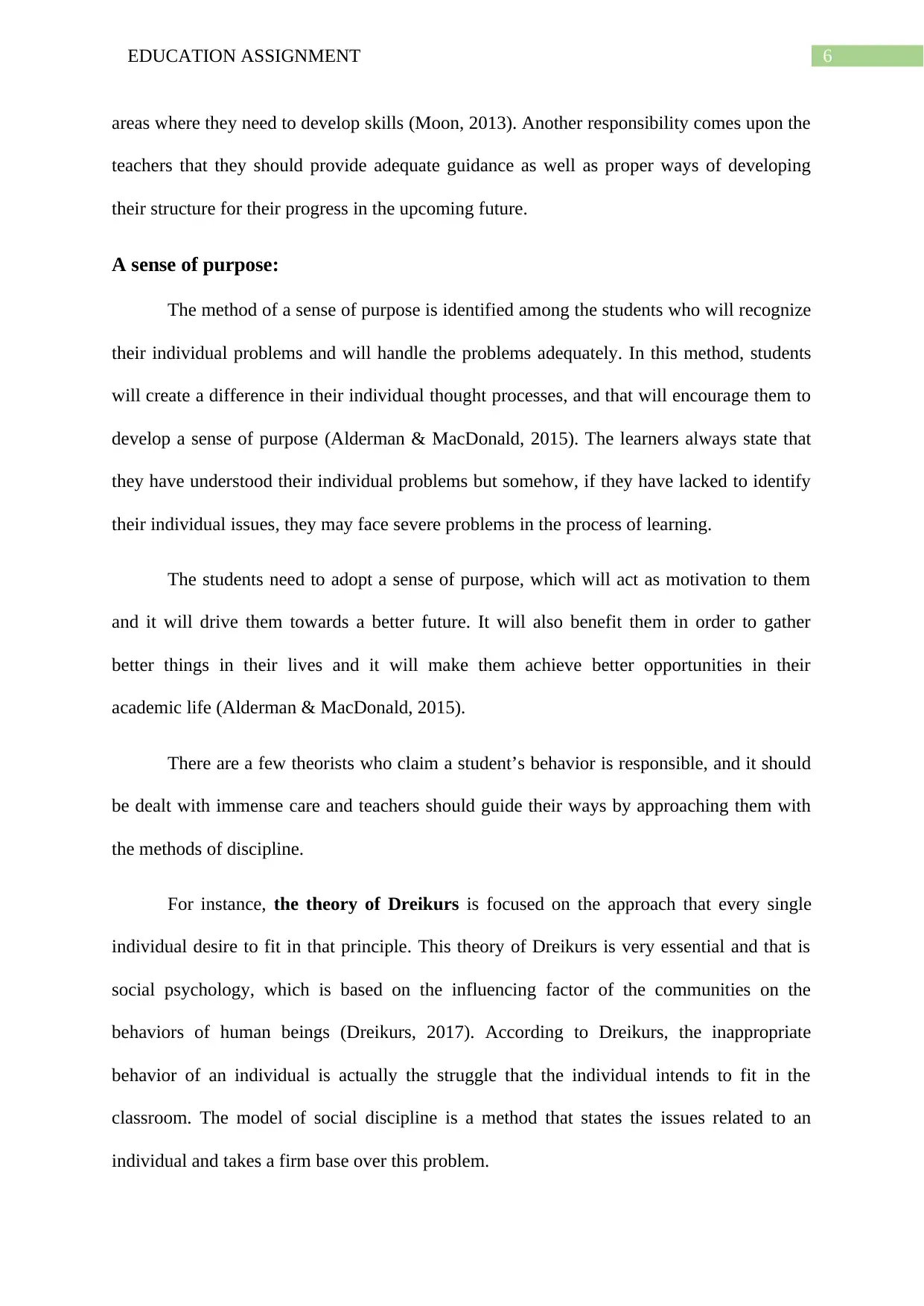
6EDUCATION ASSIGNMENT
areas where they need to develop skills (Moon, 2013). Another responsibility comes upon the
teachers that they should provide adequate guidance as well as proper ways of developing
their structure for their progress in the upcoming future.
A sense of purpose:
The method of a sense of purpose is identified among the students who will recognize
their individual problems and will handle the problems adequately. In this method, students
will create a difference in their individual thought processes, and that will encourage them to
develop a sense of purpose (Alderman & MacDonald, 2015). The learners always state that
they have understood their individual problems but somehow, if they have lacked to identify
their individual issues, they may face severe problems in the process of learning.
The students need to adopt a sense of purpose, which will act as motivation to them
and it will drive them towards a better future. It will also benefit them in order to gather
better things in their lives and it will make them achieve better opportunities in their
academic life (Alderman & MacDonald, 2015).
There are a few theorists who claim a student’s behavior is responsible, and it should
be dealt with immense care and teachers should guide their ways by approaching them with
the methods of discipline.
For instance, the theory of Dreikurs is focused on the approach that every single
individual desire to fit in that principle. This theory of Dreikurs is very essential and that is
social psychology, which is based on the influencing factor of the communities on the
behaviors of human beings (Dreikurs, 2017). According to Dreikurs, the inappropriate
behavior of an individual is actually the struggle that the individual intends to fit in the
classroom. The model of social discipline is a method that states the issues related to an
individual and takes a firm base over this problem.
areas where they need to develop skills (Moon, 2013). Another responsibility comes upon the
teachers that they should provide adequate guidance as well as proper ways of developing
their structure for their progress in the upcoming future.
A sense of purpose:
The method of a sense of purpose is identified among the students who will recognize
their individual problems and will handle the problems adequately. In this method, students
will create a difference in their individual thought processes, and that will encourage them to
develop a sense of purpose (Alderman & MacDonald, 2015). The learners always state that
they have understood their individual problems but somehow, if they have lacked to identify
their individual issues, they may face severe problems in the process of learning.
The students need to adopt a sense of purpose, which will act as motivation to them
and it will drive them towards a better future. It will also benefit them in order to gather
better things in their lives and it will make them achieve better opportunities in their
academic life (Alderman & MacDonald, 2015).
There are a few theorists who claim a student’s behavior is responsible, and it should
be dealt with immense care and teachers should guide their ways by approaching them with
the methods of discipline.
For instance, the theory of Dreikurs is focused on the approach that every single
individual desire to fit in that principle. This theory of Dreikurs is very essential and that is
social psychology, which is based on the influencing factor of the communities on the
behaviors of human beings (Dreikurs, 2017). According to Dreikurs, the inappropriate
behavior of an individual is actually the struggle that the individual intends to fit in the
classroom. The model of social discipline is a method that states the issues related to an
individual and takes a firm base over this problem.
Paraphrase This Document
Need a fresh take? Get an instant paraphrase of this document with our AI Paraphraser
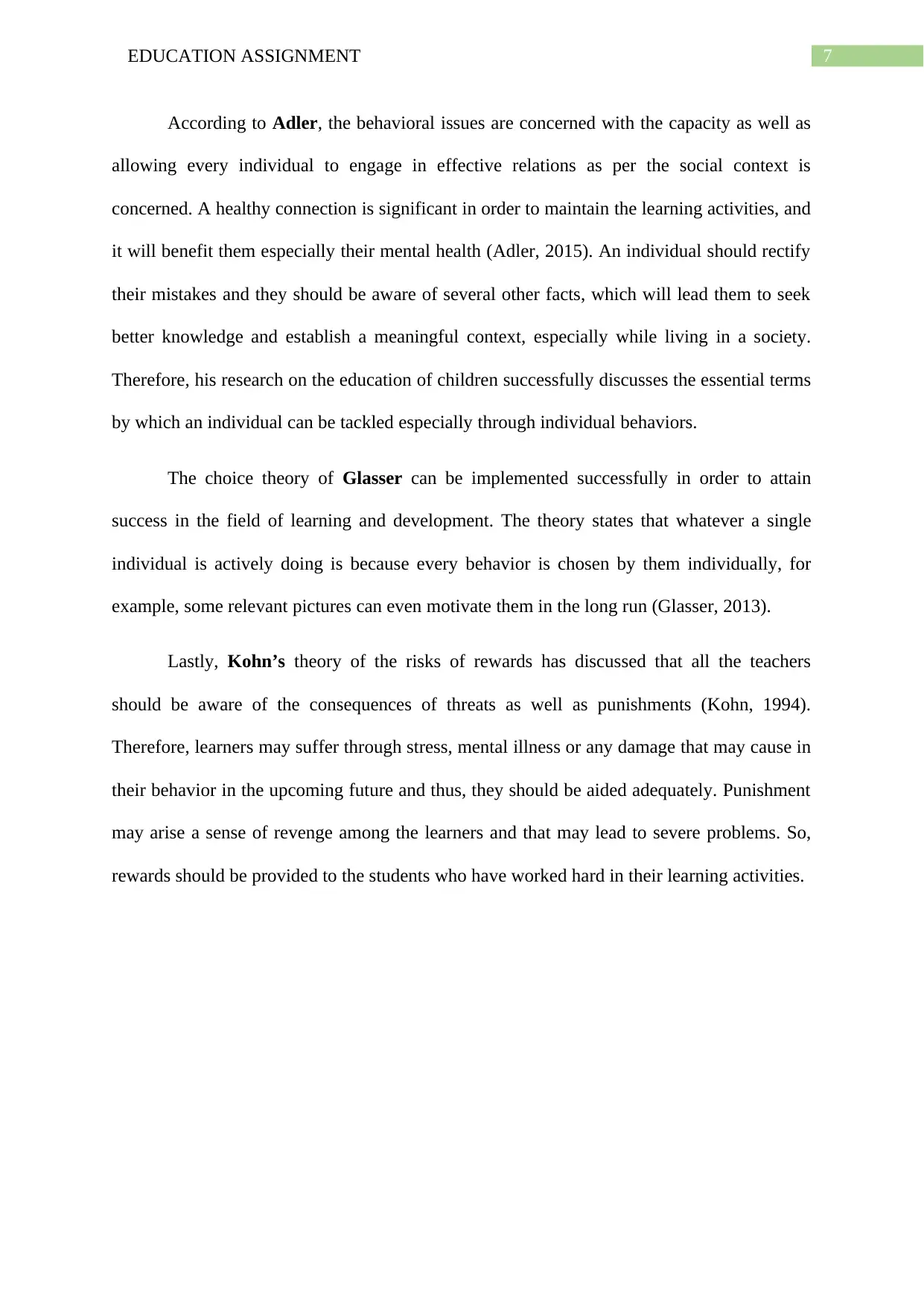
7EDUCATION ASSIGNMENT
According to Adler, the behavioral issues are concerned with the capacity as well as
allowing every individual to engage in effective relations as per the social context is
concerned. A healthy connection is significant in order to maintain the learning activities, and
it will benefit them especially their mental health (Adler, 2015). An individual should rectify
their mistakes and they should be aware of several other facts, which will lead them to seek
better knowledge and establish a meaningful context, especially while living in a society.
Therefore, his research on the education of children successfully discusses the essential terms
by which an individual can be tackled especially through individual behaviors.
The choice theory of Glasser can be implemented successfully in order to attain
success in the field of learning and development. The theory states that whatever a single
individual is actively doing is because every behavior is chosen by them individually, for
example, some relevant pictures can even motivate them in the long run (Glasser, 2013).
Lastly, Kohn’s theory of the risks of rewards has discussed that all the teachers
should be aware of the consequences of threats as well as punishments (Kohn, 1994).
Therefore, learners may suffer through stress, mental illness or any damage that may cause in
their behavior in the upcoming future and thus, they should be aided adequately. Punishment
may arise a sense of revenge among the learners and that may lead to severe problems. So,
rewards should be provided to the students who have worked hard in their learning activities.
According to Adler, the behavioral issues are concerned with the capacity as well as
allowing every individual to engage in effective relations as per the social context is
concerned. A healthy connection is significant in order to maintain the learning activities, and
it will benefit them especially their mental health (Adler, 2015). An individual should rectify
their mistakes and they should be aware of several other facts, which will lead them to seek
better knowledge and establish a meaningful context, especially while living in a society.
Therefore, his research on the education of children successfully discusses the essential terms
by which an individual can be tackled especially through individual behaviors.
The choice theory of Glasser can be implemented successfully in order to attain
success in the field of learning and development. The theory states that whatever a single
individual is actively doing is because every behavior is chosen by them individually, for
example, some relevant pictures can even motivate them in the long run (Glasser, 2013).
Lastly, Kohn’s theory of the risks of rewards has discussed that all the teachers
should be aware of the consequences of threats as well as punishments (Kohn, 1994).
Therefore, learners may suffer through stress, mental illness or any damage that may cause in
their behavior in the upcoming future and thus, they should be aided adequately. Punishment
may arise a sense of revenge among the learners and that may lead to severe problems. So,
rewards should be provided to the students who have worked hard in their learning activities.
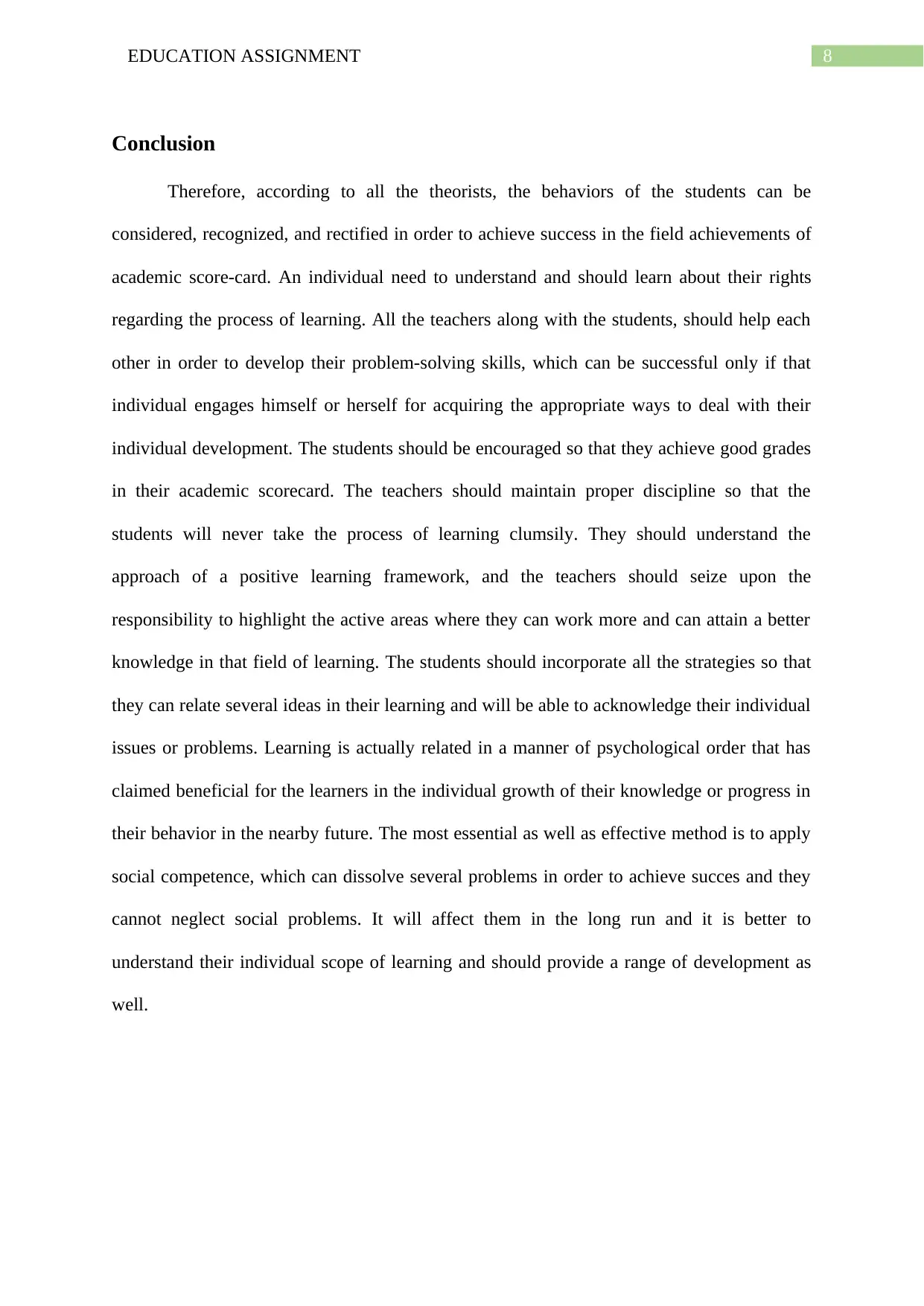
8EDUCATION ASSIGNMENT
Conclusion
Therefore, according to all the theorists, the behaviors of the students can be
considered, recognized, and rectified in order to achieve success in the field achievements of
academic score-card. An individual need to understand and should learn about their rights
regarding the process of learning. All the teachers along with the students, should help each
other in order to develop their problem-solving skills, which can be successful only if that
individual engages himself or herself for acquiring the appropriate ways to deal with their
individual development. The students should be encouraged so that they achieve good grades
in their academic scorecard. The teachers should maintain proper discipline so that the
students will never take the process of learning clumsily. They should understand the
approach of a positive learning framework, and the teachers should seize upon the
responsibility to highlight the active areas where they can work more and can attain a better
knowledge in that field of learning. The students should incorporate all the strategies so that
they can relate several ideas in their learning and will be able to acknowledge their individual
issues or problems. Learning is actually related in a manner of psychological order that has
claimed beneficial for the learners in the individual growth of their knowledge or progress in
their behavior in the nearby future. The most essential as well as effective method is to apply
social competence, which can dissolve several problems in order to achieve succes and they
cannot neglect social problems. It will affect them in the long run and it is better to
understand their individual scope of learning and should provide a range of development as
well.
Conclusion
Therefore, according to all the theorists, the behaviors of the students can be
considered, recognized, and rectified in order to achieve success in the field achievements of
academic score-card. An individual need to understand and should learn about their rights
regarding the process of learning. All the teachers along with the students, should help each
other in order to develop their problem-solving skills, which can be successful only if that
individual engages himself or herself for acquiring the appropriate ways to deal with their
individual development. The students should be encouraged so that they achieve good grades
in their academic scorecard. The teachers should maintain proper discipline so that the
students will never take the process of learning clumsily. They should understand the
approach of a positive learning framework, and the teachers should seize upon the
responsibility to highlight the active areas where they can work more and can attain a better
knowledge in that field of learning. The students should incorporate all the strategies so that
they can relate several ideas in their learning and will be able to acknowledge their individual
issues or problems. Learning is actually related in a manner of psychological order that has
claimed beneficial for the learners in the individual growth of their knowledge or progress in
their behavior in the nearby future. The most essential as well as effective method is to apply
social competence, which can dissolve several problems in order to achieve succes and they
cannot neglect social problems. It will affect them in the long run and it is better to
understand their individual scope of learning and should provide a range of development as
well.
⊘ This is a preview!⊘
Do you want full access?
Subscribe today to unlock all pages.

Trusted by 1+ million students worldwide
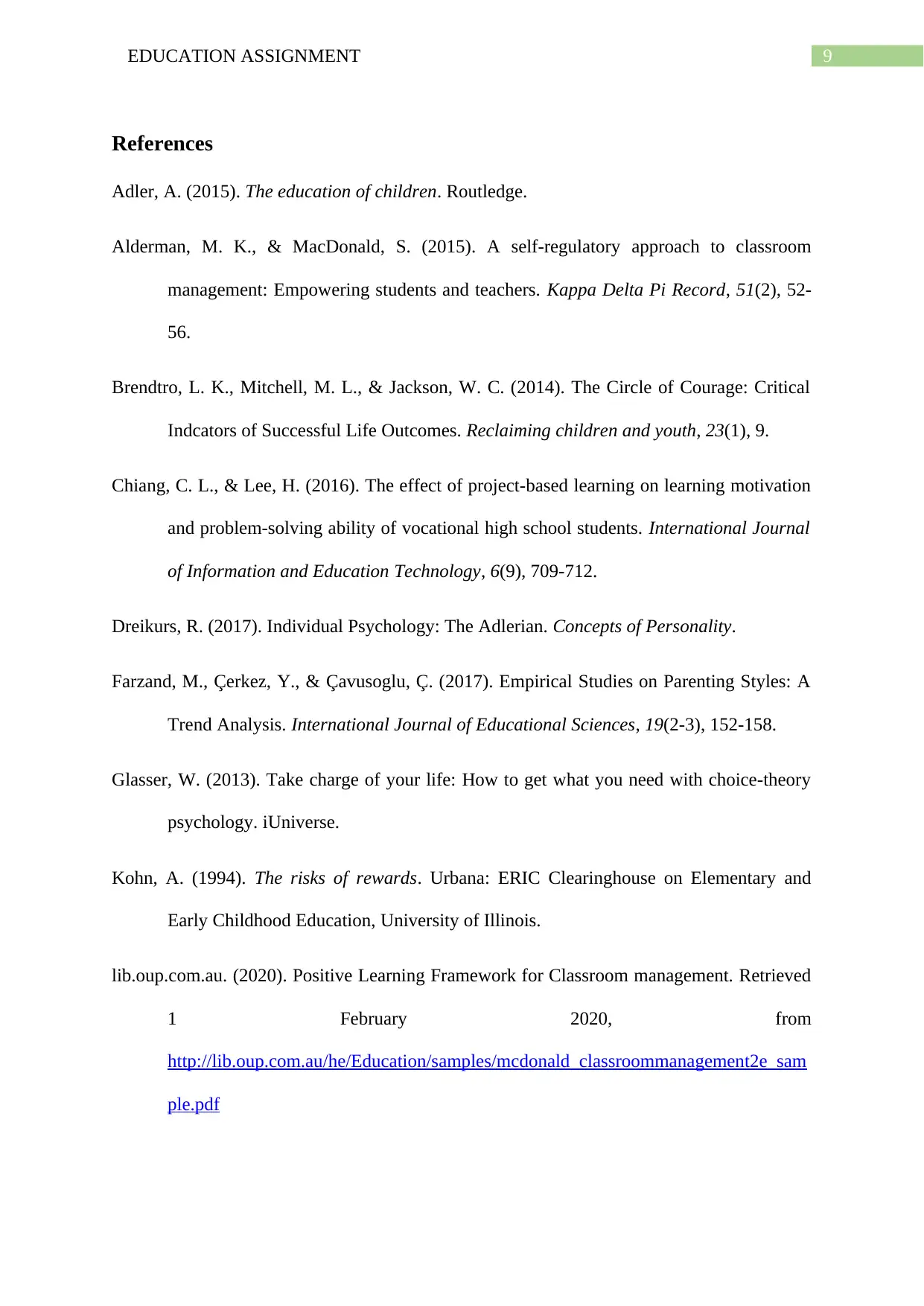
9EDUCATION ASSIGNMENT
References
Adler, A. (2015). The education of children. Routledge.
Alderman, M. K., & MacDonald, S. (2015). A self-regulatory approach to classroom
management: Empowering students and teachers. Kappa Delta Pi Record, 51(2), 52-
56.
Brendtro, L. K., Mitchell, M. L., & Jackson, W. C. (2014). The Circle of Courage: Critical
Indcators of Successful Life Outcomes. Reclaiming children and youth, 23(1), 9.
Chiang, C. L., & Lee, H. (2016). The effect of project-based learning on learning motivation
and problem-solving ability of vocational high school students. International Journal
of Information and Education Technology, 6(9), 709-712.
Dreikurs, R. (2017). Individual Psychology: The Adlerian. Concepts of Personality.
Farzand, M., Çerkez, Y., & Çavusoglu, Ç. (2017). Empirical Studies on Parenting Styles: A
Trend Analysis. International Journal of Educational Sciences, 19(2-3), 152-158.
Glasser, W. (2013). Take charge of your life: How to get what you need with choice-theory
psychology. iUniverse.
Kohn, A. (1994). The risks of rewards. Urbana: ERIC Clearinghouse on Elementary and
Early Childhood Education, University of Illinois.
lib.oup.com.au. (2020). Positive Learning Framework for Classroom management. Retrieved
1 February 2020, from
http://lib.oup.com.au/he/Education/samples/mcdonald_classroommanagement2e_sam
ple.pdf
References
Adler, A. (2015). The education of children. Routledge.
Alderman, M. K., & MacDonald, S. (2015). A self-regulatory approach to classroom
management: Empowering students and teachers. Kappa Delta Pi Record, 51(2), 52-
56.
Brendtro, L. K., Mitchell, M. L., & Jackson, W. C. (2014). The Circle of Courage: Critical
Indcators of Successful Life Outcomes. Reclaiming children and youth, 23(1), 9.
Chiang, C. L., & Lee, H. (2016). The effect of project-based learning on learning motivation
and problem-solving ability of vocational high school students. International Journal
of Information and Education Technology, 6(9), 709-712.
Dreikurs, R. (2017). Individual Psychology: The Adlerian. Concepts of Personality.
Farzand, M., Çerkez, Y., & Çavusoglu, Ç. (2017). Empirical Studies on Parenting Styles: A
Trend Analysis. International Journal of Educational Sciences, 19(2-3), 152-158.
Glasser, W. (2013). Take charge of your life: How to get what you need with choice-theory
psychology. iUniverse.
Kohn, A. (1994). The risks of rewards. Urbana: ERIC Clearinghouse on Elementary and
Early Childhood Education, University of Illinois.
lib.oup.com.au. (2020). Positive Learning Framework for Classroom management. Retrieved
1 February 2020, from
http://lib.oup.com.au/he/Education/samples/mcdonald_classroommanagement2e_sam
ple.pdf
Paraphrase This Document
Need a fresh take? Get an instant paraphrase of this document with our AI Paraphraser
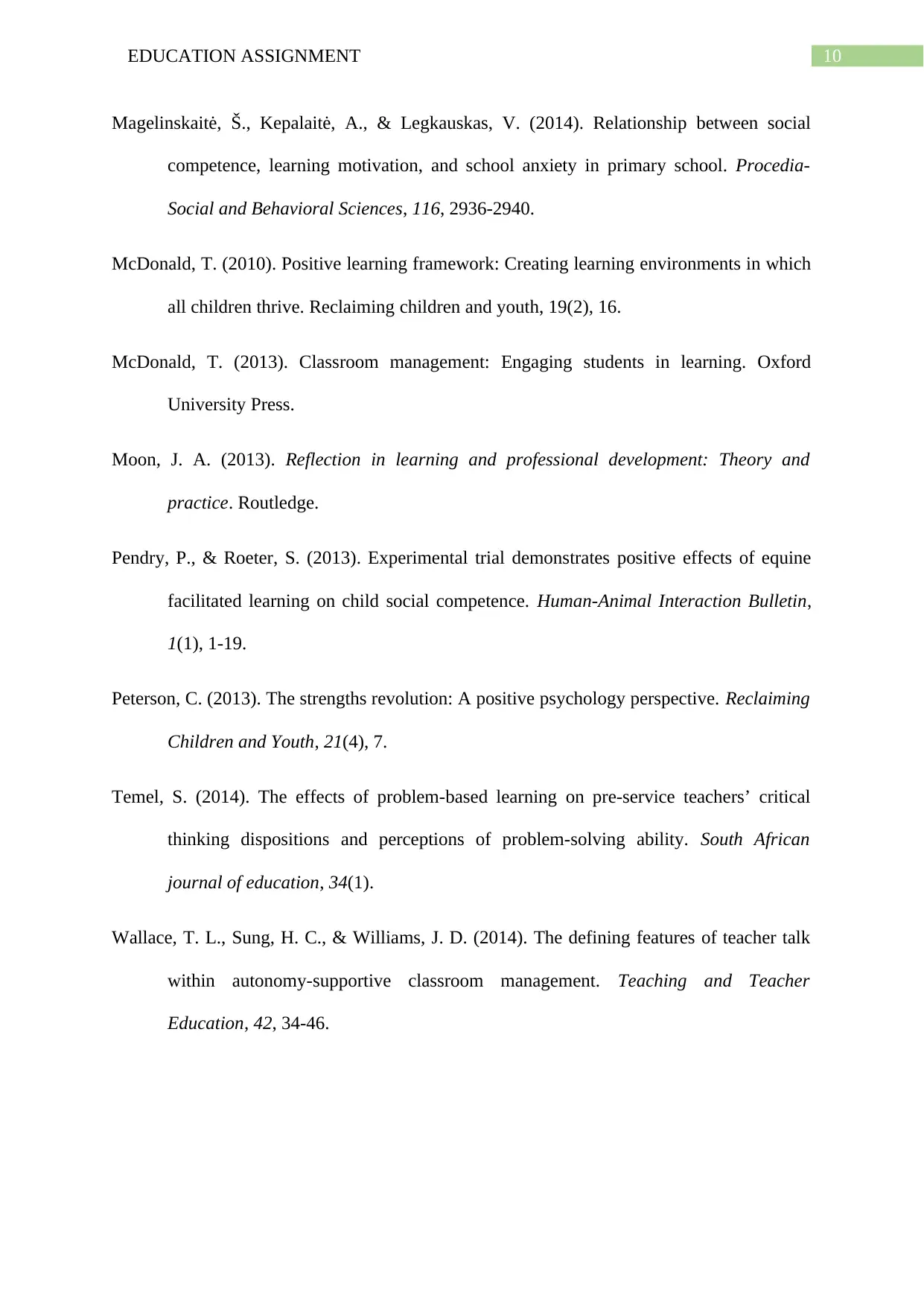
10EDUCATION ASSIGNMENT
Magelinskaitė, Š., Kepalaitė, A., & Legkauskas, V. (2014). Relationship between social
competence, learning motivation, and school anxiety in primary school. Procedia-
Social and Behavioral Sciences, 116, 2936-2940.
McDonald, T. (2010). Positive learning framework: Creating learning environments in which
all children thrive. Reclaiming children and youth, 19(2), 16.
McDonald, T. (2013). Classroom management: Engaging students in learning. Oxford
University Press.
Moon, J. A. (2013). Reflection in learning and professional development: Theory and
practice. Routledge.
Pendry, P., & Roeter, S. (2013). Experimental trial demonstrates positive effects of equine
facilitated learning on child social competence. Human-Animal Interaction Bulletin,
1(1), 1-19.
Peterson, C. (2013). The strengths revolution: A positive psychology perspective. Reclaiming
Children and Youth, 21(4), 7.
Temel, S. (2014). The effects of problem-based learning on pre-service teachers’ critical
thinking dispositions and perceptions of problem-solving ability. South African
journal of education, 34(1).
Wallace, T. L., Sung, H. C., & Williams, J. D. (2014). The defining features of teacher talk
within autonomy-supportive classroom management. Teaching and Teacher
Education, 42, 34-46.
Magelinskaitė, Š., Kepalaitė, A., & Legkauskas, V. (2014). Relationship between social
competence, learning motivation, and school anxiety in primary school. Procedia-
Social and Behavioral Sciences, 116, 2936-2940.
McDonald, T. (2010). Positive learning framework: Creating learning environments in which
all children thrive. Reclaiming children and youth, 19(2), 16.
McDonald, T. (2013). Classroom management: Engaging students in learning. Oxford
University Press.
Moon, J. A. (2013). Reflection in learning and professional development: Theory and
practice. Routledge.
Pendry, P., & Roeter, S. (2013). Experimental trial demonstrates positive effects of equine
facilitated learning on child social competence. Human-Animal Interaction Bulletin,
1(1), 1-19.
Peterson, C. (2013). The strengths revolution: A positive psychology perspective. Reclaiming
Children and Youth, 21(4), 7.
Temel, S. (2014). The effects of problem-based learning on pre-service teachers’ critical
thinking dispositions and perceptions of problem-solving ability. South African
journal of education, 34(1).
Wallace, T. L., Sung, H. C., & Williams, J. D. (2014). The defining features of teacher talk
within autonomy-supportive classroom management. Teaching and Teacher
Education, 42, 34-46.
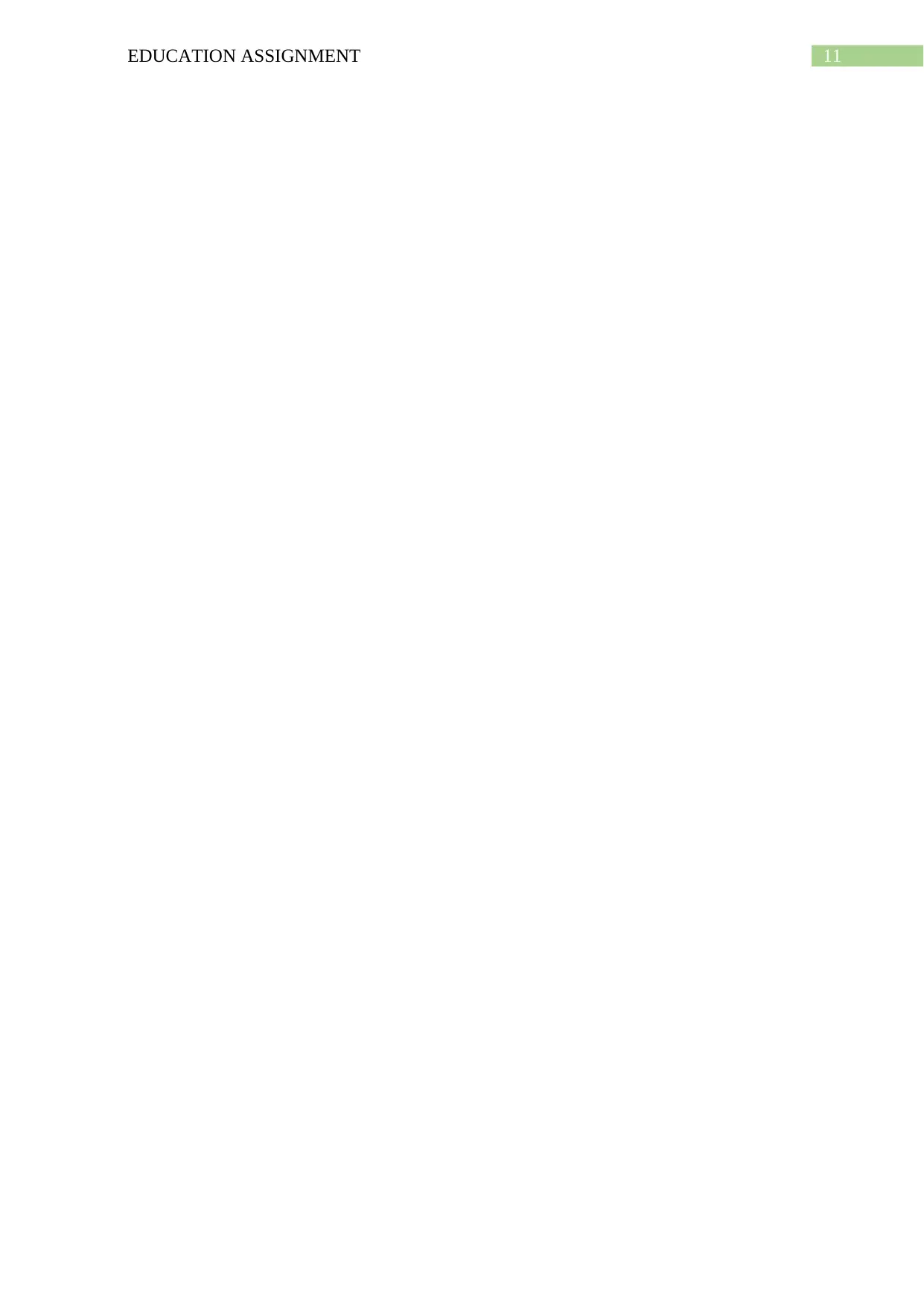
11EDUCATION ASSIGNMENT
⊘ This is a preview!⊘
Do you want full access?
Subscribe today to unlock all pages.

Trusted by 1+ million students worldwide
1 out of 12
Related Documents
Your All-in-One AI-Powered Toolkit for Academic Success.
+13062052269
info@desklib.com
Available 24*7 on WhatsApp / Email
![[object Object]](/_next/static/media/star-bottom.7253800d.svg)
Unlock your academic potential
Copyright © 2020–2026 A2Z Services. All Rights Reserved. Developed and managed by ZUCOL.




